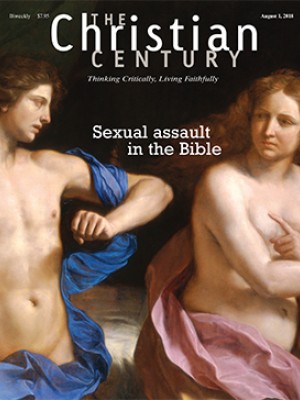In Europe, religious minorities face mounting hostility, harassment
Nationalism and anti-immigrant movements have gained ground.

A decade ago, Austria was a European country where Muslims felt they could live in peace.
Now the government includes a far-right party openly opposed to Muslims and migrants, some mosques have recently been closed down as security threats, and politicians are asking whether Muslims should be barred from fasting at school during Ramadan.
“The old days are long gone,” said Carla Amina Baghajati, a Muslim school administrator in Vienna. “If you’re visibly Muslim on the street, for example, a woman with a headscarf, you’re looked at differently now. I haven’t met anyone who says it’s like it used to be.”
Read our latest issue or browse back issues.
Casual insults and discrimination are frequent now, and young Muslims tell her they don’t bother reporting them: “They say, ‘What’s the use?’”
A recent Pew Research Center report on religious freedom around the world found that Europe registered a sharp increase in “social hostilities concerning religion” in 2016, the last year for which it has full statistics. About one-third of European countries had political parties that openly agitated against religious minorities, a jump from one-fifth the previous year, it said. The number of like-minded activist groups harassing minorities was also on the rise.
“The majority of social groups displaying this kind of nationalist or anti-immigrant and anti-minority activity—25 out of the 32—were in European countries,” the report said. Harassment was aimed mostly at Muslims and Jews, although other faiths—including some Christian groups in a few places—also faced discrimination.
The religious freedom report followed another Pew survey issued in May that showed about half the continent’s Christians, both observant and nonpracticing, thought Islam was not compatible with European values.
Surveys like these can give only partial pictures of how the times have changed. Major issues such as the current migration crisis and violent attacks on minorities grab global headlines, but lower-level hostility slips under the media radar. The current migration wave—which crested in 2015 with over a million newcomers, mostly Muslims, and prompted clampdowns on entry across Europe—has also made migrant and Muslim synonymous for many Europeans.
Baghajati, who deals with women’s issues for the main Islamic association in Austria, said the government used to regularly invite Muslim leaders to take part in panel discussions on religious issues. Under the new government of the conservative Austrian People’s Party (ÖVP) and far-right Freedom Party of Austria (FPÖ), the invitations have stopped. “They invite alarmists onto the podium but not us,” she said.
The openly anti-immigrant FPÖ has started a campaign to ban fasting during Ramadan in all state schools. (Children are exempted from fasting but teenagers participate.) Posters show a veiled girl in school with the headline: “No eating, no drinking, no learning.”
The government, Baghajati said, thinks that “Islam is a bloc, static and dangerous, and all you can do is tell them what to do. There is no partnership anymore.”
Similar difficulties can be found across Europe. France is one of the strictest countries, with a law against headscarves in state schools and full-face veils in public. Beachside towns and municipal pools have tried to use France’s law on secularism to ban the burkini, a full-body bathing suit for Muslim women, by arguing it was a sign of religious affiliation banned at publicly owned beaches and pools. There have been mixed results enforcing it.
The new populist government in Italy, whose Interior Minister Matteo Salvini uses the slogan “Italians First,” has closed Italian ports to ships that rescue migrants on the Mediterranean. He has suggested a census of Roma people in the country and deportation of those who are not Italian citizens. Critics promptly asked which minority he would want to investigate next. Salvini told a rally in Florence in June that he opposed giving Muslims permits to build new houses of worship. “What’s urgent now is to create jobs, not mosques,” he said.
In Germany, the conservative Christian Social Union party in traditionally Catholic Bavaria has threatened to topple the coalition government of Chancellor Angela Merkel if she doesn’t agree to tighter border controls against migrants.
In Eastern Europe, nationalist governments have simply refused to take in migrants, despite European Union guidelines calling for all EU members to share in the task. Poland and Hungary, the leaders in this antimigrant movement, have repeatedly said they are defending their countries’ Christian traditions against outsiders. Although there are almost no Jews left in the region, leaders use anti-Semitic rhetoric to rally support.
“We’re hearing things we haven’t heard since 1968: ‘There’s no place for you in Poland,’” said the country’s chief rabbi Michael Schudrich, referring to a communist-era wave of anti-Semitism.
In February, Poland made it a crime to say that Poles participated in the Holocaust. Tough criticism from abroad, including from the U.S. and Israel, prompted claims in the media that Poland was under attack by Jewish people. Warsaw backed down in late June, saying it would remove the criminal penalties from the law.
“European politics in general has become unhinged: the mainstream is falling apart on both sides, the center-left and now the center-right,” said Paul Taylor, a British European affairs analyst. “Almost wherever you go, the mainstream right is being overtaken by the extreme right and being pulled in that direction.” —Religion News Service
A version of this article, which was edited August 2, appears in the print edition under the title “Europe’s minority faiths face mounting hostility.”





